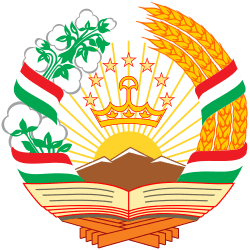Human rights in Tajikistan
 |
|---|
| This article is part of a series on the politics and government of Tajikistan |
|
Government |
| Foreign relations |
Human rights in Tajikistan, a country in Central Asia, have become an issue for international concern. The access to basic human rights remains limited, as corruption in the government, leading to the systematic abuse of the human rights of its citizens, slows down the progress of democratic and social reform in the country.
According to the US Department of State's report[1] on human rights in Tajikistan, citizens are denied many of their rights and have limited ability to change the system of government. The report found this to be especially true in the case of prisoners Prisoners, whose access to basic Human Rights was inadequate: here have been reports of torture, threats, and abuse of prisoners and detainees by security forces due, in part, to their ability to act with impunity. The denial of the right to a fair trial for those who stand accused of a crime has been identified as another issue, which can often contribute to harsh and life-threatening prison conditions as well as the blocking of international access to Tajikistan prisons. Pre-trial detention is typically longer than needed, and court proceeding are controlled by the prosecution. Prisons are overcrowded, and the incidence of tuberculosis and malnutrition is high among inmates.
Other restrictions include restrictions on media, freedom of speech, freedom of association, and freedom of worship, as well as restrictions on political opposition. Registration and visa difficulties, violence and discrimination against women, human trafficking, and child labour have also been reported.[2] Tajikistan is also reported to be both a source and a transit point for human trafficking.[3]
Intimidation and killings of journalists
It has been reported that, in the 1990s, dozens of journalists were killed or disappeared in mysterious circumstances in Tajikistan. Together with increasing attacks on journalists, the 2005 parliamentary elections brought increased closures of independent and opposition newspapers. In 2003, the government blocked access to the only internet website run by the political opposition and in June 2014, YouTube was partially blocked by the government.[4]
Name change law
According to Ilan Greenberg, writing in the New York Times in 2007,[5] The President of Tajikistan Emomalii Rahmon, stated that the Slavic "-ov" ending must be dropped for all babies born to Tajik parents. The policy came about in the wake of recent policies intended to remove vestiges of Russian influence on the country. In light of this, some Tajiks have expressed confusion or opposition at the denial of the freedom to choose the name for one's child.
Freedom of religion
Some activities of religious groups have been restricted by the requirement for registration with the State Committee on Religious Affairs. Islamic pilgrimages are restricted, and religious groups such as the Jehovah's Witnesses have suffered occasional persecution: since October 22, 2007, Jehovah's Witnesses have had their practices banned by the government.[6]
Allegations of systematic violence against military conscripts
In June 2014 Global Voices Online reported that the practice of systematic violence against military conscripts (referred to as dedovshina) had risen to public awareness following a recent increase in incidences of manslaughter and suicides in the Tajik Army, and the April 17, 2014 death of Akmal Davlatova, who was beaten to death by his lance sergeant.[7][8] Kidnapping of recruits was said to be a common practice in Tajikistan and victims have sometimes videotaped their own kidnappings.[9][10]
See also
- Capital punishment in Tajikistan
- LGBT rights in Tajikistan
- Central Asia Health Review
- Human rights in Asia
References
- ↑ "Tajikistan". U.S. Department of State. Retrieved 2017-01-09.
- ↑ "Human Rights Reports: Tajikistan". U.S. Department of State. Retrieved 2016-10-19.
- ↑ https://iwpr.net/global-voices/rise-human-trafficking-tajikistan
- ↑ YouTube Partially Blocked In Tajikistan By RFE/RL's Tajik Service, June 10, 2014, http://www.rferl.org/content/youtube-partially-blocked-in-tajikistan/25416452.html
- ↑ Greenberg, Ilan (2007-03-28). "Tajik President Outlaws Slavic Endings on Names". The New York Times. ISSN 0362-4331. Retrieved 2017-01-09.
- ↑ Jehovah's Witnesses: Office of Public Information Authorized Site
- ↑ Tajikistan's Army Chokes Young Draftees to Death, Posted 10 June 2014 8:57 GMT , http://globalvoices.org/2014/06/10/tajikistans-army-chokes-young-draftees-to-death/
- ↑ Radio Free Europe, 11 июня 2014, Таджикистан, Дело о «поперхнувшемся хлебом» солдате направлено в суд, http://rus.ozodi.org/content/article/25411009.html
- ↑ YouTube, Published on Apr 11, 2012, видео, добавленное с мобильного телефона, https://www.youtube.com/watch?v=ogYXVMin43A
- ↑ Tajikistan's Army Chokes Young Draftees to Death, Posted 10 June 2014 8:57 GMT , http://globalvoices.org/2014/06/10/tajikistans-army-chokes-young-draftees-to-death/
External links
- Censorship in Tajikistan - IFEX
- Report on Tajikistan 2006 - Amnesty International
- Country Report on Human Rights Practices in Tajikistan - US Department of State
- Record Breaking Winter Weather Hits Children in Tajikistan the Hardest Central Asia Health Review Feb. 17, 2008
![]()